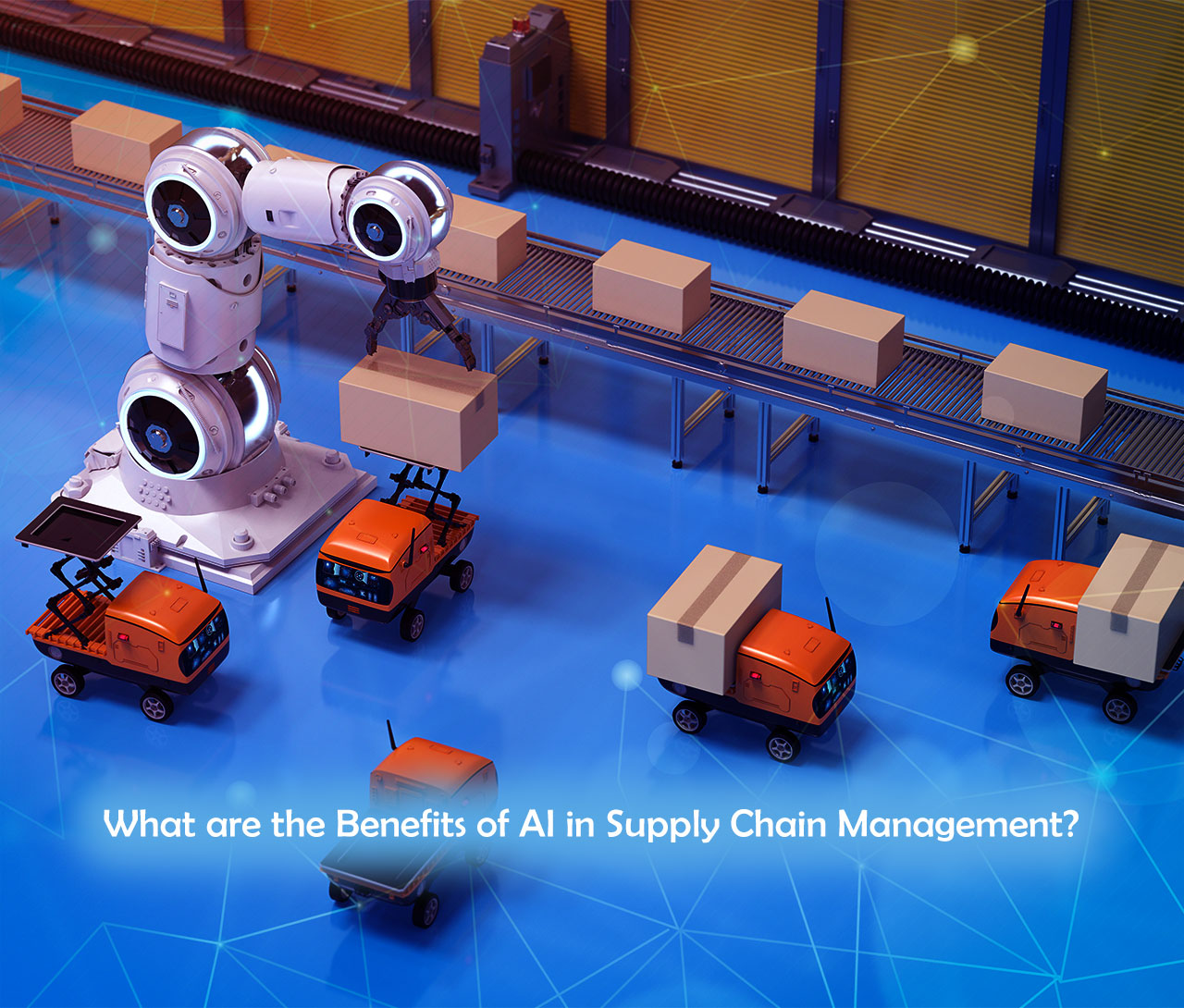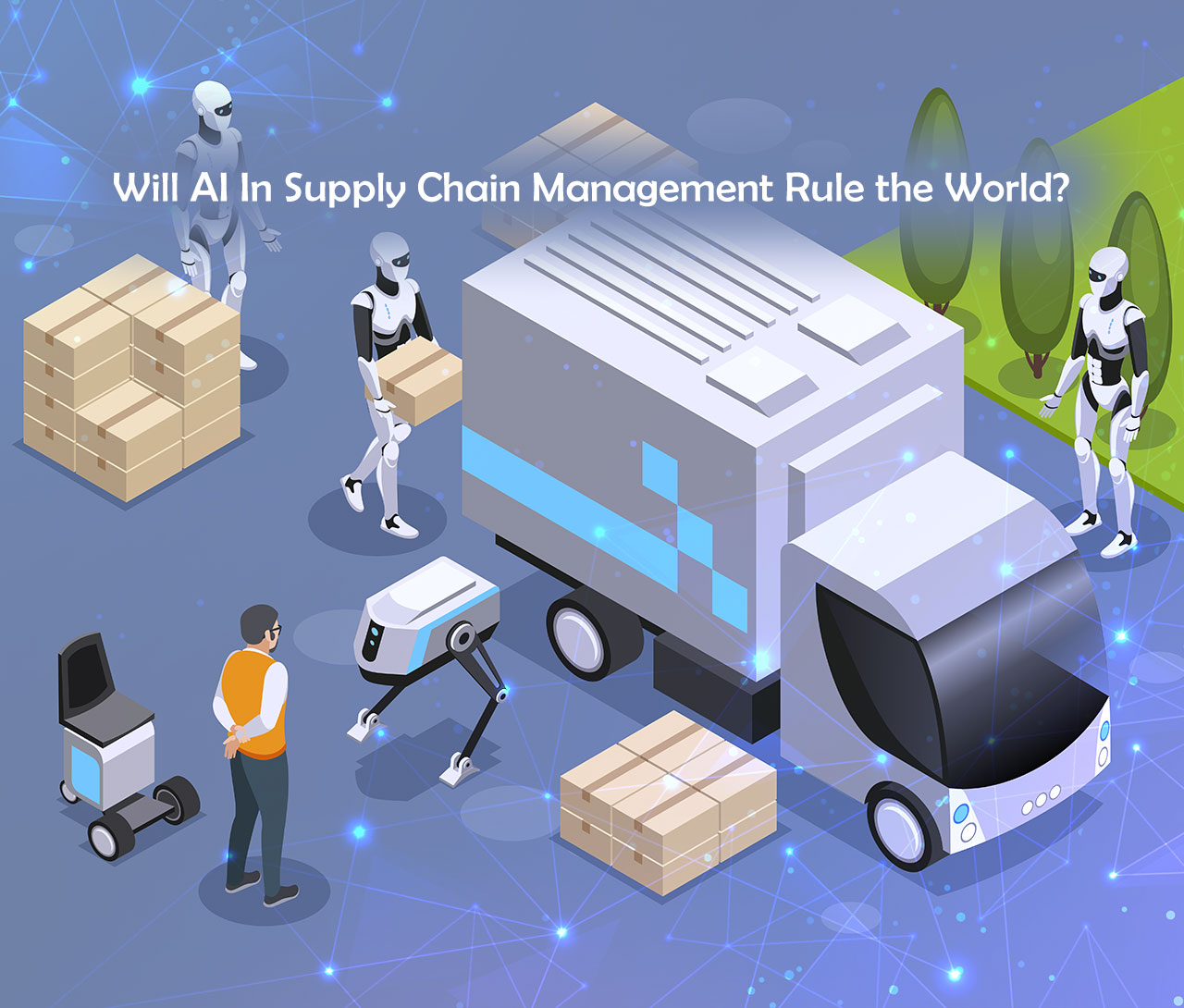A supply chain is a vital network connecting business activities, crucial for organizational success. Recent disruptions, like the 2020 pandemic, emphasized the vulnerability of weak supply chains. In response, companies are investing in digital solutions, with artificial intelligence (AI) emerging as a key player in optimizing supply chain operations and fostering advancements across industries. Without further ado, let’s learn everything about AI in supply chain management.
What is AI in Supply Chain Management?
Artificial Intelligence in supply chain management is the use of AI tools and methods to streamline and mechanize different supply chain processes. It involves using cutting-edge algorithms, artificial intelligence, and data analytics to boost operational effectiveness, spur innovation, and improve decision-making throughout the supply chain ecosystem.
Demand forecasting, inventory optimization, route optimization, risk management, real-time tracking, and process automation are just a few of the uses of AI in supply chain management. Research indicates that 37% of businesses, including those in the supply chain sector, are currently experiencing the advantages of AI solutions. Furthermore, it is anticipated that AI will make a substantial contribution of $15.7 trillion to the global economy by the year 2030.
What are the Benefits of AI in Supply Chain Management?
There are various benefits of using AI in supply chain management.
- Accurate inventory management is crucial for maintaining a seamless flow of goods in and out of warehouses, preventing overstocking, inadequate stocking, and unexpected stockouts. However, the complexity of the inventory management process, involving multiple variables like order processing, picking, and packing, can lead to time-consuming tasks and errors.
- AI-driven supply chain planning processes and tools offer a solution by efficiently handling vast amounts of data. These intelligent systems rapidly analyze and interpret large datasets, providing timely insights into supply and demand forecasting. Some advanced AI systems even predict consumer habits and forecast seasonal demand, helping anticipate future trends and minimizing the costs associated with overstocking.
- Warehouse efficiency is a pivotal component of the supply chain, and AI-based automation plays a crucial role. It ensures the timely retrieval of items from warehouses, streamlining the journey to the customer. AI systems can address warehouse issues quickly and accurately, simplifying complex procedures and expediting work. Automation efforts driven by AI not only save time but also significantly reduce the need for and cost of warehouse staff.
- Enhanced safety is another advantage of AI-based tools in warehouse management. Automated systems can analyze workplace safety data, identify potential risks, and keep manufacturers informed. They record stocking parameters, update operations, and incorporate feedback loops, enabling swift reactions to maintain secure and compliant warehouses.
- Reduced operational costs are a noteworthy benefit of integrating AI systems into the supply chain. From customer service to warehouse operations, automated intelligent processes minimize human oversight-led errors and workplace incidents. Warehouse robots contribute to higher productivity with greater speed and accuracy, resulting in reduced operational costs.
- On-time delivery is facilitated by AI systems that decrease reliance on manual efforts, making the entire process faster, safer, and smarter. Automated systems accelerate traditional warehouse procedures, eliminating operational bottlenecks along the value chain and ensuring timely delivery to customers as committed.
Will AI In Supply Chain Management Rule the World?
While AI is transforming supply chain management and offering numerous benefits, it is unlikely to “rule the world” in this context. Successful implementation of AI requires addressing challenges such as data sharing and integration, organizational changes, and upskilling. Additionally, the complexity of supply chain operations and the need for human expertise and decision-making limit the complete dominance of AI. Rather, AI should be seen as a tool to augment human capabilities and improve supply chain performance when integrated effectively.
How to use AI in Supply Chain Management?
Artificial intelligence has the potential to transform supply chain management by offering advanced capabilities and insights. The role of AI in supply chain management is discussed below:
- Predictive Analytics: AI excels in accurately forecasting future demand through data analysis. This allows companies to optimize inventory, streamline processes, and minimize the risks of stockouts or overstocking.
- Real-time Tracking and Optimization: AI-powered systems enable real-time tracking, optimizing delivery routes, reducing fleet downtime, enhancing fuel efficiency, and identifying and avoiding bottlenecks.
- Demand Forecasting: AI analyzes demand signals, optimizing inventory levels and replenishment plans. This helps companies navigate challenges like demand volatility, supply constraints, production scheduling, and dynamic distribution.
- Risk Management: AI aids in identifying and mitigating supply chain risks, such as disruptions, delays, or quality issues. It achieves this by analyzing historical data and recognizing patterns.
- Process Optimization: AI optimizes various supply chain processes, including product development, manufacturing, and distribution. It factors in considerations like materials, sourcing, manufacturing processes, cost constraints, pricing, sustainability, and resilience.
- Recommendation Systems: AI provides intelligent recommendations to optimize working capital, predict future shortages, and enhance outcomes, especially in areas like on-time delivery performance.
- Data Analysis and Insights: AI’s ability to analyze vast amounts of supply chain data offers teams deeper insights at a higher frequency and granularity, facilitating better decision-making.
It’s crucial to recognize that while AI holds significant potential, successful implementation necessitates thoughtful considerations such as data sharing, integration with existing systems, and addressing organizational challenges.
By embracing AI in supply chain management, businesses can elevate efficiency, cut costs, enhance customer satisfaction, and secure a competitive edge in today’s dynamic marketplace.
Final Words
AI helps companies minimize stockouts or overstocking, cut expenses, and optimize resource allocation by empowering them to make data-driven decisions. AI-powered real-time tracking and monitoring improve visibility, allowing for proactive risk management and effective delivery processes. AI in supply chain management is reshaping the landscape by enabling businesses to achieve greater efficiency, agility, and customer satisfaction. With the help of AI, businesses can unlock new opportunities, optimize operations, and drive success in today’s dynamic and complex supply chain landscape.


